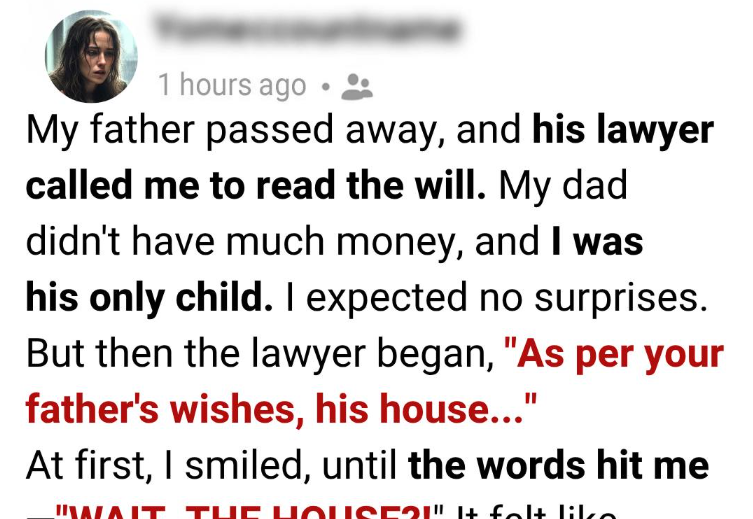When my father passed away, I believed I had severed every bond that linked me to him. Then his lawyer reached out. A residence I had no knowledge of—and the individual residing within it—unlocked a revelation I had never anticipated.
The downpour persisted as I rushed along the pavement, pulling my coat firmly against my body. Each stride toward the notary’s office weighed down my spirit further.
Dad had departed.
He served as my foundation throughout the years, even while his existence gradually crumbled beneath obligations I failed to comprehend—borrowings, delayed bills, ultimate demands. We faced overwhelming challenges, and the dwelling we occupied teetered on the edge of seizure.
Thus, I prepared for what I assumed would mark the concluding strike: one additional indication that no worthwhile possession endured.
The structure carried scents of aged documents and dampness. As I positioned myself opposite the notary, he acknowledged me courteously and sorted through a pile of official papers.
“Let’s proceed,” he stated, adjusting his voice.
I scarcely paid attention. My thoughts wandered amid recollections—Dad instructing me on bicycle riding, scorching breakfast cakes during weekend dawns, whispering soft regrets when circumstances unfolded differently than planned.
Then a phrase pierced the haze enveloping my mind.
“There exists a property.”
I blinked rapidly. “Pardon me—a what?”
“A residence,” he replied, pushing a sheet in my direction. “Not the one where you presently reside. An additional dwelling your father possessed.”
I gazed at the document until the letters merged. He had never referenced a secondary residence. Not ever. No images. No writings. No indications. Why conceal such a matter?
My fingertips followed the border of the sheet, seeking stability.
Had he hidden it deliberately? Or did this represent his method of bequeathing me something—anything at all?
Regardless, I needed to view it.
On Friday morning, I secured leave from my employment and traveled by vehicle to the location specified in the testament.
The path curved amid lofty trees adorned with amber foliage, remaining motionless and hushed as though protecting mysteries I prepared to reveal.
Upon reaching the site, my inhalation halted.
The residence positioned itself at the conclusion of a pebbled path, its aged brick enveloped in climbing vines and eras gone by. The veranda displayed recent coating, vivid against the faded covering above. It appeared both unfamiliar and oddly recognizable.
I grasped the key provided by the notary.
“This marks the spot?” I murmured.
I ascended the stairs and inserted the key into the mechanism.
It failed to rotate.
I attempted once more.
No response.
Perplexed, I moved around to glance through a pane.
Abruptly, the entrance swung wide.
“May I assist you?”
A lady—approaching seventy years, firm chin, and a gaze keen enough to slice—occupied the threshold, staring at me as though I had harmed her companion animal.
“I… I hold that this constitutes my residence,” I expressed, displaying the key. “It transferred to me via my father’s testament.”
“My residence?” She arched an eyebrow. “I have occupied this space for two decades. I covered each restoration, each service, each seepage. This location belongs to me. And I intend to remain.”
My core sank.
I clenched the key more firmly.
“I lack knowledge of your identity,” I articulated cautiously, “but the title indicates differently. By law, the residence pertains to me.”
“I disregard whatever documents you present,” she retorted sharply. “I invested my essence into this dwelling. You expect me to depart because an individual arrives bearing a single page?”
I advanced a pace.
“I have surrendered all—my dwelling and my father. This residence… it represents everything remaining. I cannot depart from it.”
She regarded me without speech. Briefly, her rigid countenance wavered—as if an ancient ache had emerged visibly.
Then she released a breath.
“You may remain. Temporarily. I am Deborah.”
She shifted sufficiently for my entry.
The residence carried aromas of evergreen cleanser and accumulated narratives. What I had yet to discover was that each groaning plank and damaged ceramic contained fragments of a history never shared with me.
At present, Deborah and I—strangers by law—occupied the same shelter.
Residing with Deborah resembled navigating a subdued conflict zone with care.
She avoided shouting or issuing warnings; rather, she transformed every minor instance into something intimate.
During evenings, she ravaged the cooking area—accessing cupboards, closing compartments forcefully, rattling cookware—as if preparing nocturnal banquets for unsettled spirits.
In the dawns, precisely when I activated the spout to cleanse my teeth, the flow would cease abruptly.
“In earnest?” I grumbled at the basin.
Upon addressing her, she merely lifted her shoulders. “Conduits age.”
Yet the satisfied expression upon her countenance conveyed a different message.
Then my device charger disappeared. Then my access implements. I ultimately located them in peculiar spots, such as the storage area or beneath a seating pad.
Trivial? Indeed. Impactful? Equally so.
Nevertheless, below her resolute exterior, I detected another layer—a melancholy, a form of urgency that adhered to her like an outline.
By Monday, fatigue overwhelmed me—bodily, intellectually, sentimentally.
I faced a lawful appointment that afternoon and required an orderly appearance. I had cleansed and pressed a pale garment the previous evening, suspending it to dry outdoors.
As I emerged outside, I halted.
It rested upon the earth—a soaked, soil-smeared, destroyed remnant.
“Beyond belief!” I exclaimed while charging into the cooking space.
Deborah occupied a seat at the surface, serenely consuming her infusion.
“You find this amusing?” I cast the saturated garment near her.
She remained composed.
“Any issue?”
“You discarded my attire into the filth. For what reason? What action warranted this?”
She placed her vessel down with firm control.
“You have no place here. This residence fails to belong to you. It never did.”
My inhalation paused. “What do you mean?”
Her gaze intensified.
“This served as my dwelling. Your father—he seized all. He claimed you, our child, and disappeared.”
The statements struck me forcefully.
“What?”
She approached nearer, her tone quivering.
“He informed you of my demise, correct? He failed to pardon me. Yet I continued pondering you. I am your mother.”
My limbs nearly gave way.
She retrieved from her compartment a tiny band.
“This,” she declared, placing it into my palm.
I examined it closely.
My name and arrival date appeared inscribed upon the material.
Moisture clouded my sight.
“Why enact such?” I murmured.
Her expression collapsed.
“Because I departed. I believed I discovered superiority. But that individual abandoned me likewise. Upon my return, delay prevailed. The tribunal granted him guardianship. And he withheld forgiveness.”
I lacked utterances.
The lady who had driven me to limits… embodied the mother I had never encountered.
She surveyed the residence.
“He bequeathed me this location. Perhaps it acknowledged our history. Expressing gratitude, maybe, for granting him you. But he avoided residing here anew—not amid all the recollections.”
Abruptly, all fury dissipated from me, substituted with profound grief.
The days preceding the tribunal session unfolded in tense quietude.
We navigated around one another like apparitions, occupying a delicate area.
I devoted my time to assembling the reality—concerning the residence, concerning my father, and concerning the lady asserting maternal ties.
When the decision arrived, it proved swift: Deborah retained the residence. Her twenty years of occupancy, restorations, and contributions established her as the legitimate possessor.
Positioned beyond the justice building, clutching the documents, I sensed an internal fracture.
Returning to the residence, I assembled belongings silently, pulling my travel case toward the entrance.
Deborah remained in the cooking area, observing.
“Well,” I stated, infusing firmness into my tone, “that concludes matters.”
Her tone gentled. “Hold.”
I rotated. “Yes?”
She advanced.
“I prefer your presence,” she expressed. “I harbored self-loathing for extended periods. Upon your arrival, I knew no alternative to resentment. But you are my child. I refuse another loss.”
I regarded her.
“Do you mean this?”
She affirmed with a motion.
“I seek restoration. If you permit. I regret.”
I responded without speech.
I embraced her.
She stiffened initially, but then she softened, encircling me with her limbs as though permanence guided her.
“I regret as well… Mom.”
In the subsequent weeks, we cleansed surfaces and accessed long-sealed containers. The chambers brimmed with dialogue and the comforting aroma of newly brewed beverage. Gradually, the residence transformed—from a zone of strife to a true haven.
Pardon arrived without haste.
But affection?
It endured throughout, awaiting its opportunity.







